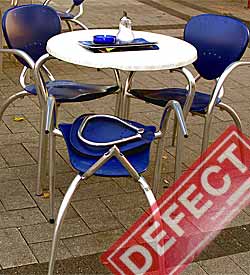Product
Liability
Product liability or as some call it, products
liability, refers to the responsibility for a defective product
anywhere along the manufacturing chain.
This manufacturing chain includes the components
manufacturer, the assembler of the components, the wholesaler,
distributor and retailer of the defect product. Since there is
no federal product liability law that governs all states, the
U. S. Department of Commerce has promoted the Model Uniform Products
Liability Act (MUPLA), which many states follow.
Since some states do not follow this policy, it is important
to find out the laws in your state governing product liability
through a product liability
attorney or through your own research.
In addition, not all products have to be tangible to be defective.
Some can be intangibles such as gas, naturals such as pets, real
estate or writings including instructions, charts and graphs.
Product liability usually falls into one of three different categories.
Defective products may be tried under strict liability, negligence
or breach of warranty. Defects can be in the product's design,
manufacturing or marketing. A product may be deemed unreasonably
dangerous because of an inherent design flaw before the manufacturing
phase. Liability may also be assessed because of a problem in
the manufacturing process that differed from the design. In addition,
in the marketing phase, the product may be liable if improper
or inadequate warnings or instructions are attached.
Strict
Liability
Most products liability cases come under the heading of strict
liability. With strict liability it does not matter if the manufacturer
exercised great care in creating the product. What matters is
that the product itself has been deemed defective and has caused
injury. Negligence is not claimed in strict liability cases. Most
strict liability cases focus on the manufacturing process rather
than the design or marketing processes.
In strict liability cases it is assumed that the manufacturer
of the product is the expert over the product and should know
whether the product is dangerous or not. The consumer is not considered
an expert in most cases and assumes less responsibility to know
the dangers of products.
Negligence
Negligence in product liability cases, reflect the negligence
standards in other personal injury cases. The plaintiff must proof
that a relationship between the manufacturer and consumer has
been established (and thus a duty is owed), the duty was breached,
the breach of duty caused an injury to the consumer, the injury
resulted in monetary damages.
Negligence may be found in all three categories of products liability
cases. When it is found in the marketing phase, however, it is
called Breach of Warranty. In the other two categories, negligence
is defined as the failure to exercise due care that a reasonable
and prudent person would exercise. Negligence is tried most often
in defective product design cases and less often in product manufacturing
cases.
Breach
of Warranty
Breach of warranty is most often associated with a failure to
warn consumers about the inherent dangers of a product or use
of the product. Breach of warranty is considered by some to be
a more specifically defined form of negligence. There are three
typical categories for breach of warranty including breach of
express warranty, breach of implied warranty of merchantability
and breach of implied warranty of fitness for a particular purpose.
Breach of express warranty means the manufacturer violated their
own written guarantee. Breach of implied warranty means the defective
product was reasonably understood to be free from defect and no
disclaimers such as "as is" or "with faults"
indicated otherwise. Breach of implied warranty of fitness for
a particular purpose means the seller knew the buyer's purpose
and the buyer was relying on the seller's skill and judgment to
fulfill that purpose.
These are the basics of products liability. Since product liability
laws vary from state to state, it is important to research the
laws in your particular state. Products liability lawyers specialize
in this particular area of the law, so if you think you have a
case, you'll want to seek help from a qualified attorney adept
at knowing many various manufacturing processes and state law
governing consumer protection.
|


